by Julie McMillian | Mar 12, 2021
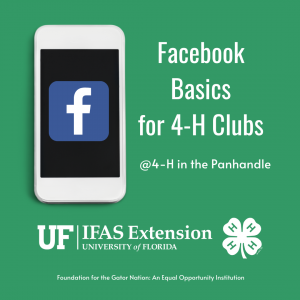 As we look at the ever-changing social media journey, we think how can we keep up? Honestly, we probably never do and that’s okay. Social media can be an efficient way to communicate with 4-H families and also recognize the great things 4-Hers are doing! While you should never rely on only one form of communication to connect with every age group, social media can be an effective strategy. While Facebook is not the “go-to” platform for youth, most parents and community stakeholders are on Facebook. This article covers the basics of setting up a Facebook Group for your 4-H club the right way. Facebook is an approved platform through the University of Florida to use for 4-H, but there are some guidelines that need to be followed:
As we look at the ever-changing social media journey, we think how can we keep up? Honestly, we probably never do and that’s okay. Social media can be an efficient way to communicate with 4-H families and also recognize the great things 4-Hers are doing! While you should never rely on only one form of communication to connect with every age group, social media can be an effective strategy. While Facebook is not the “go-to” platform for youth, most parents and community stakeholders are on Facebook. This article covers the basics of setting up a Facebook Group for your 4-H club the right way. Facebook is an approved platform through the University of Florida to use for 4-H, but there are some guidelines that need to be followed:
1. Ask your local 4-H agent to be an administrator with you. Two sets of eyes are better than one and they can help you follow the right path for youth protection and be a resource for correct branding and logos. Also, if your 4-H agent is an administrator, it is really easy for him or her to share posts to the county 4-H page (when appropriate).
2. Create a Facebook Group instead of a Facebook Page for your club. Unlike Facebook Pages, you can change Group privacy settings and limit who can see information. Anyone can follow a Facebook Page whereas a Group can allow only approved members to see information. We must be sensitive to the personal information we share about our youth. How do I create a Facebook group? Steps for creating a FB Group
3. Follow the emblem guidelines for the proper use of University of Florida’s 4-H name and brands. UF IFAS Extension 4-H Graphics. Don’t forget that your club needs to be chartered in order to use the 4-H Name and Emblem.
4. Know who has a publicity release in your club. Youth with no photo release should not be shared in private groups and club leaders who will share information in the group must be aware of these limitations. Participation Release
5. If social media isn’t your “thing,” enlist help from another volunteer! You could also delegate responsibilities to one of the youth officers in your club to help with posting and interactions (with supervision of course).
Now you might be thinking what should a 4-H club talk about on Facebook? How will this Group be helpful? Here are a few ideas:
- Upcoming events
- Sharing of information and questions
- Advertisement for your club
- Fundraisers
- Recognize youth (if you have parental consent)
- Pictures, videos, and articles
- Challenges and surveys
- Information from the District and State programs
4-H volunteers are the true leaders who help our youth succeed by providing meaningful experiences every time programming is delivered. Our hope is that you feel empowered to incorporate positive engagement with youth by using relevant and innovative communication as technology advances. To learn more about incorporating social media for 4-H clubs or becoming a 4-H volunteer, join us next Thursday, March 18th at 6pm central/7pm eastern for our webinar on social media for 4-H clubs. You can also contact your local UF IFAS Extension Office UF IFAS Extension Office or visit Florida4-H.org.Social Media Tips
by Jena Gilmore | Dec 4, 2020
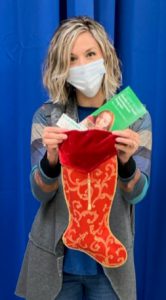
Care stockings for elderly residents.
Amid holiday season, one of the busiest times of the year, it’s a great opportunity to find ways to serve others. There are many activities that will allow you to safely relieve the fatigue of quarantine, virtual school and zoom meetings by getting into the spirit of giving through 4-H service projects.
Traditionally, community service projects would include a group of 4-H members banding together one day to clean yards for the elderly or visit nursing homes or volunteer at local shelters. Although COVID-19 limits many forms of our traditional service projects, youth and their families can still coordinate amazing opportunities amidst our new normal of social distancing. Remember, while participating in any 4-H affiliated programs or projects, all members, families, and volunteers must adhere to our safety protocols which include but are not limited to wearing masks the entire time, remaining 6-feet apart, hand sanitizing and washing regularly, and more found here.
Here are some safe alternatives to implement with your local 4-H program, club, or businesses:
- Power Hour Yardwork– If outside activities are your forte, have families sign up to clean one location together as a family unit. Remain masked, gloved, and wash hands regularly to ensure safety of yourself and others. Set obtainable goals for your one-hour timeframe to limit traffic and need for the use of facilities.
- Business Lawn Decorating- Some business, such as Elderly Rehabilitation Centers and Nursing Homes, allow outside groups to decorate the outside areas of their facilities for the holidays. This is a great way to show off your creative side and even drum up some friendly competition. Remember to follow UF COVID guidelines (wear masks, social distancing, etc).
- 4-H Care Stockings- Pack stockings with hygiene items, socks, word games, and/or prewrapped snacks and deliver them to long term care facilities or even local businesses. Be sure to include information on 4-H, whether it be a card, business card, or 4-H pledge bookmark! You never know where we may find new 4-H Volunteers or members.
- 4-H Book Buddies- Find a facility that would allow you to read a book (even better if you dressed in character) to their clientele. While this may not be feasible in person with COVID restrictions, offer to pre-record a session and either email or share the link!
- Food Drives- Set up a location (preferably at your 4-H office) for locals to donate unperishable items in containers that can be sprayed with disinfectant spray. Work with your 4-H Agent or other adults to set up where these items will be distributed to.
- 4-H Furever Gifts- Put those sewing (or tying) skills to good use and make some dog toys, blankets, or beds out of old t-shirts or jeans. These make perfect donation pieces to pet shelters and rescue facilities!
- 4–H Pen Pals- Contact your local elderly residential facilities to see if 4-H members could submit cards/letters to residents. Be sure to speak to someone in management to get approval for contact information. Another alternative to this would be to contact classroom teachers and ask if you can send a letter or card to the class. This would be a great way to recruit future 4-H’ers too as you share your own stories!
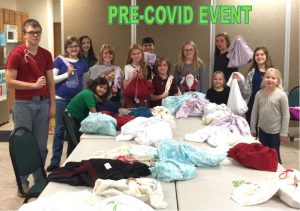
4-H’ers packed pillow case hygiene packs for residents at the Chautauqua Rehabilitation Center.
Service projects are an excellent method of targeting life skills in the “head and heart” areas of the targeting life skills model. Teaching our youth to care about others instills empathy while teaching them the spirit of giving activates community service volunteering. For more ways to volunteer in your county, check with you local 4-H office and seek ways that you can volunteer with 4-H today!
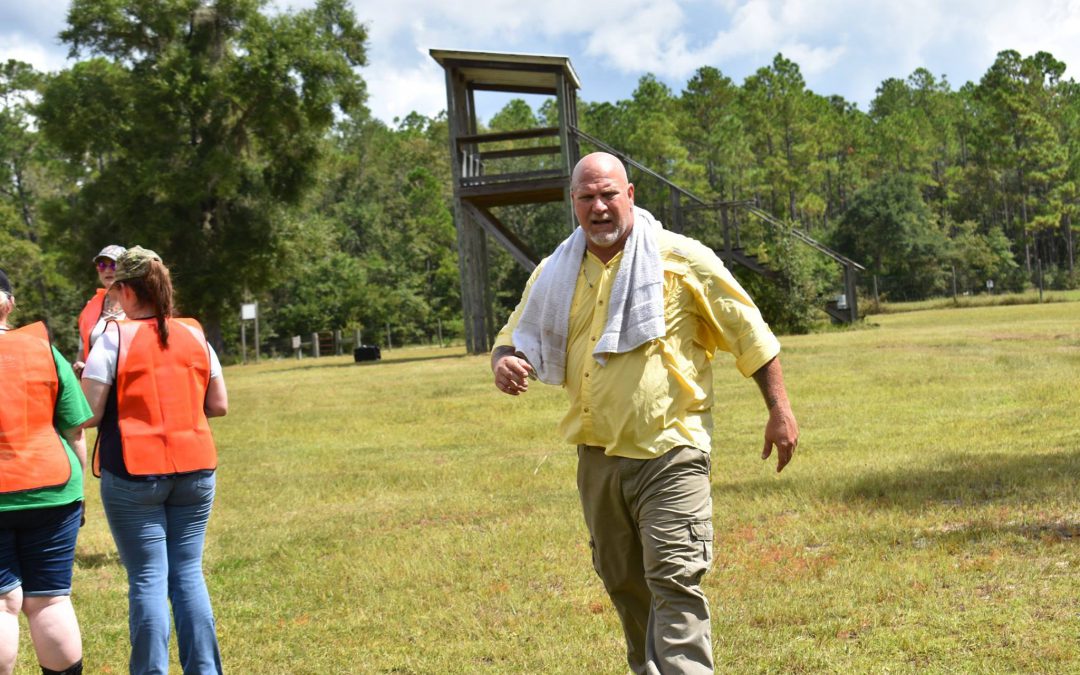
by Rachel Pienta | Apr 24, 2020
April is National Volunteer Month. Throughout the month of April, 4-H programs in counties across the Northwest UF/IFAS Extension District from Jefferson to Escambia counties take time to recognize volunteers and the contributions those volunteers make with their time and talent to youth development in their communities. Ken Gooding is a 4-H Shooting Sports Volunteer Leader in Wakulla County. Ken serves as President for the county’s 4-H shooting sports advisory group. He also provides organizational and content expertise for the program in a volunteer coordinator capacity.
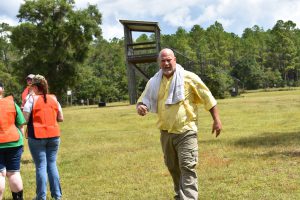
Ken Gooding volunteers on the range teaching archery and skeet shooting.
Ken co-founded the Wakulla 4-H Shooting Sports Club now known as “4-H Sharpshooters” in 2018. Since that time, the club has grown to include over forty youth members who learn archery and skeet shooting and ten adult volunteers who support club activities. In his volunteer role with Shooting Sports, Ken leads adult volunteers and develops youth leaders.
Leading Leaders of All Ages with 4-H
After he became a state certified Level One Shooting Sports Instructor in 2018, Ken continued his training at the national level. In 2019, Ken became nationally certified as a Level Two shooting sports archery instructor. This credential qualifies Ken to teach adult volunteers seeking Level One certification in archery.
For Ken, volunteering with 4-H is an expression of his passion for giving back to the community. Ken said, “I volunteer with 4-H because I believe I have a responsibility to share the skills I have with next generation and 4-H gives me the tools I need to effectively pass on this skill to a wide variety of youth in my community that would not otherwise have the opportunity that 4-H provides.
Giving Back to the Community
4-H volunteers help UF/IFAS Extension to amplify their reach into the community. Volunteers are said to be the civic heart of most communities. Ken shared his perspective on why he believes it is important to volunteer in the community:
“To actually be a member of a community, a person must have a vested interest in the success of the community. In the past, that interest was expressed in the general desire to see the community as a whole grow and flourish. Each member brought a particular skillset that when joined with others enabled the community to flourish. But each member also felt a duty or responsibility was owed to the community they helped to build, the community that provided for their individual success and prosperity. This is where 4-H, only one small opportunity for our community members can give back, comes in. Every one of our neighbors has a skill or a passion that they are uniquely qualified to impart to the youth of our community and 4-H has the tools each one of us needs to see that the lessons we’ve learned over a lifetime are not lost to time.”
Ken had a message to share about why he believes everyone should take time to volunteer. He noted the tremendous efforts often exhibited during times of emergency and shared that he often wonders what good things would happen if we all put a tenth of that energy into their community on a daily basis. In closing, Ken said that if he could make an ask of the community, he would ask that, “Each and every member of every community give a little bit of themselves back to their community. Think about, with that small commitment, what kinds of changes for the better could be achieved. I’ll be willing to bet, you’ll receive a greater return for your efforts.”
When Ken is not busy with 4-H, he works as a barge captain on the Mississippi River and volunteers with the Wakulla County Sheriff’s Office at the Sheriff’s shooting range. He also raises rabbits and chickens with his wife, Trena. Ken also shares his talents as a professional deejay with 4-H. Whether he is teaching archery or making the party happen with music, Ken is a valued volunteer and an inspiring role model for aspiring leaders of all ages.
For more information about UF/IFAS Extension programs, follow this link to connect with your local office.
Resources
by Rachel Pienta | Apr 26, 2019
People choose to volunteer for a multitude of reasons. In the case of Wakulla County 4-H volunteer Greg James, there seem to be few reasons why he wouldn’t want to volunteer to meet a need in his community – especially if it helps youth.
Why Greg Volunteers
“Volunteering in my community is very important to me. I believe serving your community in some fashion helps create a sense of pride, belonging and ownership. I think it’s important to provide our children a positive environment in which to grow. Volunteering for 4-H allows me to foster that environment.”

Greg James joined a 4-H Club member to promote an upcoming community event.
Thirty Years of Investment
While Greg (and his wife of close to 30 years, Karen) live in Sopchoppy, there are few areas of the county where Greg’s volunteerism has not had an impact. While Greg and Karen’s children have grown up and left the county to pursue college and careers, involvement with area youth has remained a constant in his life since moving to the county in 1995.
In his professional life, Greg wears two hats – he serves as the Wakulla County Finance Director and the Deputy Clerk of Court. Some community members may know him best as the minister of the Sopchoppy Church of Christ.
On almost any given day, Greg can found serving his community – as a volunteer cross country coach, stirring a pot at a Low Country Boil charity event, cleaning up the coastline or lending time to a local civic committee. For the last two years, Greg has served in a leadership role with the Wakulla County 4-H and Extension Advisory Councils, and he started a 4-H Finance Club last summer to help local teens learn financial management skills.
Hands On Leadership
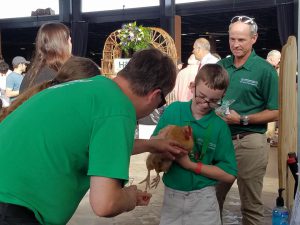
Greg observes a 4-H Poultry Club member demonstrate chicken handling at a community event.
In service to 4-H, Greg give his financial expertise and his hands – figuratively and literally. To celebrate the success of the 4-H Chicken Champs Club, he made people-sized chicken figures that have become a popular photo opportunity at 4-H events. His most recent undertaking is still in progress – refurbishing old metal bleachers by hand for the 4-H Archery Club range.
Sali Polotov, a Future Leaders Exchange Program student from Tajikistan, is a member of the 4-H Finance Club and shared his thoughts on learning with Greg as club leader. “He is a great leader and speaker. Every time I go to Finance Club, I explore something new. He explains difficult things so easily. Also, he has a great collection of foreign coins!
Greg wasn’t introduced to 4-H until his own children were growing up and completed swine projects. “Now that I know all of the great programs 4-H offers, I wish I had been more involved.”
As a volunteer leader, Greg also works to recruit more volunteers to help grow 4-H programs. His advice to anyone who thinks they might want to volunteer is simple – “Don’t wait!”
Make a Difference with 4-H – Volunteer
Greg said, “I would ask that (people) stop thinking about it and just do it! Our 4-H program depends heavily on volunteers, and what we are able to accomplish is only limited by the number and caliber of our volunteers. Please volunteer and make a positive impact on your community and our kids!”
For more information on how to become a 4-H volunteer in your community, contact your local UF/IFAS Extension Office. To see how 4-H is positively impacting the lives of Panhandle youth, follow us on Facebook.
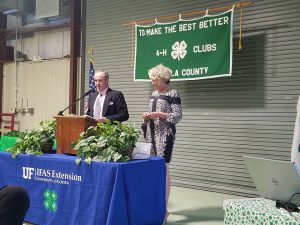
Greg James prepares to swear in new 4-H Association leaders for 2019.
Additional Resources:
by Whitney Cherry | Apr 18, 2019
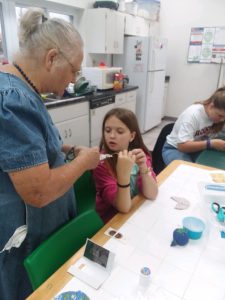
Volunteers across the panhandle make a difference in the lives of young people in their communities by simply sharing the things they love.
June Clemons and Peg Frith are a mother-daughter team who can do anything! From time to time, they’ve volunteered for 4-H, but the first time I asked them to help me teach a small sewing project during a cooking day camp, I knew I’d struck gold. Anyone can learn to sew but having the patience to teach it…that’s a whole other story.
It took me a couple of years to talk them into leading a sewing club, and honestly, I think they talked themselves into it. The holdup wasn’t a lack of desire to help; it was hesitancy to commit to something but not being able to follow through.
In fact, Peg’s advice to anyone thinking about becoming a 4-H volunteer is:
“I’d tell them it can be hard to find the time to plan, organize, and implement meetings, but it’s very rewarding. If you commit, see it through. Don’t disappoint the children.”
June emphatically said, “Do it!”
So why do June and Peg commit their precious time to 4-H? They first got involved because they had positive experiences as 4-H’ers and wanted to pass on the skills they learned. But now, it’s the kids they work with that keep them coming back. They both said that “teaching useful, lifelong skills to children and just enjoying being with them as they learn,” is their favorite part about volunteering with 4-H.
I asked June and Peg if they thought their 4-H work was making a difference.
June says, “All you have to do is see the joy in their faces upon completing a task to know how it affects the members.”
Peg added, “I get to see firsthand their sense of accomplishment. And the fact that they keep coming back to class tells me that the club is making a difference in their lives.”
As further evidence that June and Peg are making a difference, club parents have shared their children not only come home from their sewing club meetings excited to show what they made that day, but they have also started stitching up seams in their clothes and stuffed animals.
As a 4-H agent, I can tell you that the independence and mastery displayed by these young club members is exactly what we’re looking for from our 4-H’ers, and good club leaders help them achieve it.
Are you wondering if you have what it takes to make a difference in the lives of young people in your community?
You don’t have to be an expert. You don’t have to have kids or grandkids of your own. You don’t have to have been a former 4-H’er. You just have to love something enough to want to share it with the next generation. So what’s your passion? Pass it on!
There are many ways to volunteer with 4-H, and we need you – from fair exhibit and public speaking judges, to club leaders, chaperones, camp nurses, and more. To pass on your passion and help the youth in your area Grow in 4-H, contact your local UF/IFAS Extension Office to find the best volunteer role for you.
 As we look at the ever-changing social media journey, we think how can we keep up? Honestly, we probably never do and that’s okay. Social media can be an efficient way to communicate with 4-H families and also recognize the great things 4-Hers are doing! While you should never rely on only one form of communication to connect with every age group, social media can be an effective strategy. While Facebook is not the “go-to” platform for youth, most parents and community stakeholders are on Facebook. This article covers the basics of setting up a Facebook Group for your 4-H club the right way. Facebook is an approved platform through the University of Florida to use for 4-H, but there are some guidelines that need to be followed:
As we look at the ever-changing social media journey, we think how can we keep up? Honestly, we probably never do and that’s okay. Social media can be an efficient way to communicate with 4-H families and also recognize the great things 4-Hers are doing! While you should never rely on only one form of communication to connect with every age group, social media can be an effective strategy. While Facebook is not the “go-to” platform for youth, most parents and community stakeholders are on Facebook. This article covers the basics of setting up a Facebook Group for your 4-H club the right way. Facebook is an approved platform through the University of Florida to use for 4-H, but there are some guidelines that need to be followed:







